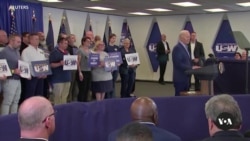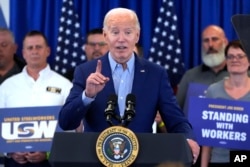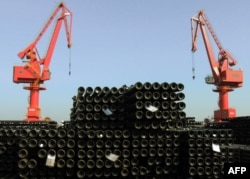In response to mounting pressure from labor unions anxious about the impact of cheap Chinese exports on the U.S steel industry, President Joe Biden is poised to triple tariffs on steel and aluminum imports from China.
“They're not competing. They're cheating,” Biden said Wednesday in remarks to the United Steelworkers union in Pittsburgh, Pennsylvania. “They're cheating. And we've seen the damage here in America.”
Pennsylvania is one of a few battleground states that could determine the success of the president’s reelection bid against former President Donald Trump, the presumptive Republican nominee.
“Under my predecessor, who's busy right now, Pennsylvania lost 275,000 jobs,” Biden said in a jab at Trump, who is on trial in New York on charges of falsifying business accounts to disguise hush money payments related to his 2016 election campaign.
Biden boasted of creating 800,000 new manufacturing jobs since taking office, including 28,000 in Pennsylvania.
He accused Beijing of “heavily” subsidizing Chinese steel companies that dump their products on the global markets at “unfairly low” prices. China is responsible for almost half of global steel production.
The tariff hike proposal by Biden, who calls himself the “most pro-union president in American history,” echoed Trump’s “America First” trade approach against China.
In 2018, the former president announced a 25% tariff on some imported steel products and a 10 percent tariff on some imported aluminum products, under Section 232 of the Trade Expansion Act.
However, Trump’s action did not increase tariffs for some other steel and aluminum products, which are currently levied at a much lower 7.5% rate. Biden is directing U.S. Trade Representative Katherine Tai to explore tripling the tariff rate on those products under Section 301 of the Trade Act of 1974, the White House said in a statement.
Rachel Ziemba, an adjunct senior fellow at the Center for a New American Security, or CNAS, said the Biden administration is reviewing why some Chinese steel derivatives currently have a 25% tariff and some have a 7.5% tariff.
“Arguably, what they're proposing to do now might normalize the level of steel tariffs across almost all sorts of steel products that are coming in from China,” she told VOA.
In a statement to VOA, the Trump campaign dismissed Biden’s proposal.
“The Biden campaign is attacking President Trump's effective tariffs on China – while the Biden White House is planning to implement similar tariffs on Chinese steel and aluminum,” said Trump’s national press secretary, Karoline Leavitt. “Biden's team is either run by hypocrites or people who don't know what they're doing.”
Protectionist sentiment
The proposed tariffs reflect the resurging protectionist sentiment now embraced by politicians on both sides of the aisle.
“Rather astonishingly, trade tariffs have entered the political mainstream,” said William Howell, Sydney Stein professor in American politics at the University of Chicago Harris School of Public Policy.
“After decades of bipartisan agreement on the benefits of open international markets, Republican and Democratic presidents now are looking for ways to protect select domestic industries from international competition,” he told VOA.
The shift, Howell added, involves a rethinking of the costs and benefits of free trade as well as political considerations of the two presidential candidates as they try to shore up union support in key battleground states.
The White House denies political motivation. A senior administration official said the move is not aimed at courting union workers, a powerful voting bloc.
“It has nothing to do with elections,” the official told reporters during Wednesday’s briefing. “We're actually acting from a place of self-confidence and strength because our economy is growing and manufacturing is rebounding.”
China was the seventh-largest exporter of steel to the United States in 2023 with 598,000 net tons total shipments of all steel products, according to Census Bureau data compiled by the American Iron and Steel Institute, an industry trade group that welcomed Biden’s proposal.
The economic effect of tripling the tariffs against such small volumes of Chinese steel and aluminum imports will be minor, said Gary Hufbauer, a senior fellow at the Peterson Institute for International Economics.
“But the announcement may shift some votes,” he told VOA.
While Biden has signaled that the Section 301 review is a high priority, the timeline of his proposed tariff increase, and its potential impact, are not clear.
“There are a lot of details to come out that won't be clear until the final rule and judgment is revealed,” Ziemba of CNAS said.
Working with Mexico
Since Section 232 is related to national security rather than dumping or import surges, exemptions were allowed on certain derivatives of aluminum and steel from partner countries beginning in 2020.
Full or partial exemptions apply to steel derivatives from Argentina, Australia, Brazil, Canada, Japan, the European Union, Mexico, South Korea and the United Kingdom. The same applies to aluminum derivatives from Argentina, Australia, Canada, the EU, Mexico and the U.K.
Biden said he recently sent a delegation to meet with Mexican President Andrés Manuel López Obrador, to ensure that Chinese companies can’t circumvent the tariffs by shipping steel there for subsequent export to the U.S.
“Mexico and the United States are going to work together to solve this, I promise you,” he said.
He said his administration will unveil a probe into “unfair practices” in the Chinese shipbuilding industry, following a petition from United Steelworkers and four other unions.
In a statement to VOA, Chinese Embassy Spokesperson Liu Pengyu said U.S. tariffs against China are “the embodiment of unilateralism and protectionism.” He pointed out that in 2020, the World Trade Organization ruled that Trump-era tariffs imposed on China in 2018 breached international trade rules.
“The U.S. is making the same mistake again and again by seeking to triple the tariff rate on Chinese steel and aluminum products and launching Section 301 investigations targeting China's maritime, logistics and shipbuilding sectors,” he said.
Liu added his government hopes the administration will “implement the important consensus and spirit” agreed by Biden and President Xi Jinping during their 2023 meeting in San Francisco and cancel tariffs through the Section 301 review.
Asked Wednesday if he was concerned his tariff hike plans would impact relations with Xi, Biden said, "No," without elaborating.
Increasingly, steel has become an election issue particularly in the so-called “Rust Belt,” the country’s manufacturing, steelmaking, and coal-producing heartland that went through industrial decline, resulting in high unemployment.
During a visit earlier this month by Japanese Prime Minister Fumio Kishida, a staunch U.S. ally, Biden repeated his opposition to the proposed acquisition of U.S. Steel by Japanese group Nippon Steel.
"U.S. Steel has been an iconic American company for more than a century. And it should remain totally American,” Biden underscored Wednesday.
The USW endorsed Biden for reelection in March, shortly after he announced his opposition to the takeover deal.
Trump has also pledged that he would block the $14.9 billion offer for U.S. Steel.
Paris Huang and Lin Feng contributed to this report.

















